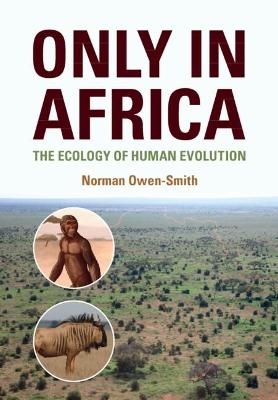
Only in Africa
Cambridge University Press (Verlag)
978-1-108-95966-7 (ISBN)
That humans originated from Africa is well-known. However, this is widely regarded as a chance outcome, dependant simply on where our common ancestor shared the land with where the great apes lived. This volume builds on from the 'Out of Africa' theory, and takes the view that it is only in Africa that the evolutionary transitions from a forest-inhabiting frugivore to savanna-dwelling meat-eater could have occurred. This book argues that the ecological circumstances that shaped these transitions are exclusive to Africa. It describes distinctive features of the ecology of Africa, with emphasis on savanna grasslands, and relates them to the evolutionary transitions linking early ape-men to modern humans. It shows how physical features of the continent, especially those derived from plate tectonics, set the foundations. This volume adequately conveys that we are here because of the distinctive features of the ecology of Africa.
Norman Owen-Smith headed the Centre for African Ecology at the University of the Witwatersrand before his retirement as Emeritus Professor there. He is an A-rated scientist and Fellow of the Royal Society of South Africa. He received Gold Medals from the Zoological Society of Southern Africa and the South African Association for the Advancement of Science, Wildlife Excellence Award from the Southern African Wildlife Management Association, Honorary Life Membership in the Ecological Society of America, and was awarded a Harry Oppenheimer Fellowship in 2005. He has written or edited six books, including Megaherbivores: The Influence of Very Large Body Size on Ecology (Cambridge, 1988) and Adaptive Herbivore Ecology: From Resources to Populations in Variable Environments (Cambridge, 2002).
Preface; Foreword; List of abbreviations; Part I. The physical cradle: Land forms, geology, climate, hydrology and soils: 1. High Africa: Eroding surfaces; 2. Climate: Rainfall seasonality; 3. Water in rivers, lakes and wetlands; 4. Bedrock geology: Volcanic influences; 5. Soils: Foundations of fertility; Part II. The savanna garden: Grassy vegetation and plant dynamics: 6. Forms of savannah; 7. How savanna trees and grasses grow and compete; 8. Plant demography and dynamics: Fire traps; 9. Paleo-savannas: Expanding grasslands; Part III. The big mammal menagerie: Herbivores, carnivores and their ecosystem impacts: 10. Niche distinctions: resources versus risks; 11. Big fierce carnivores: Hunting versus scavenging; 12. Herbivore abundance: Bottom-up and top-down; 13. How large herbivores transform savanna ecosystems; 14. Paleo-faunas: Rise and fall of the biggest grazers; Part IV. Evolutionary transitions: From primate ancestors to modern humans: 15. Primate predecessors: From trees to ground; 16. Primate ecology: From forests into savannas; 17. How an ape became a hunter; 18. Cultural evolution: From tools to art and genes; 19. Reticulate evolution through turbulent times; 20. Prospects for a lonely planet; Index.
| Erscheinungsdatum | 08.10.2021 |
|---|---|
| Zusatzinfo | Worked examples or Exercises |
| Verlagsort | Cambridge |
| Sprache | englisch |
| Maße | 170 x 244 mm |
| Gewicht | 740 g |
| Themenwelt | Naturwissenschaften ► Biologie ► Evolution |
| Naturwissenschaften ► Biologie ► Ökologie / Naturschutz | |
| Naturwissenschaften ► Geowissenschaften ► Mineralogie / Paläontologie | |
| ISBN-10 | 1-108-95966-0 / 1108959660 |
| ISBN-13 | 978-1-108-95966-7 / 9781108959667 |
| Zustand | Neuware |
| Haben Sie eine Frage zum Produkt? |
aus dem Bereich


